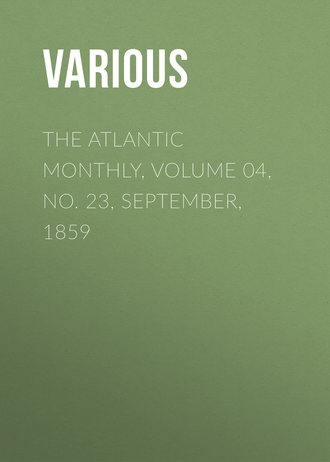 полная версия
полная версияThe Atlantic Monthly, Volume 04, No. 23, September, 1859
Of course the element of Love is not wanting; two golden threads run through the crimsoned web; but whether they meet before Atropos comes with the fatal shears, it is not best to say. When the modern novel-reader can answer the momentous question, "Did they marry?" the charm of the most exciting story, for him, is gone.
Aside from the interest which one feels in the changing fortunes of the hero, the book is especially valuable for the light it throws upon that period of Italian history, and upon the subtilties of Italian character.
1
This picture is now in the Louvre. It is a composition of great dramatic power. Mrs. Stowe gives a graphic description of the effect it produced upon her, in her "Sunny Memories of Sunny Lands."
2
The worship of this Great Mother is not more wonderful for its antiquity in time than for its prevalence as regards space. To the Hindu she was the Lady Isani. She was the Ceres of Roman mythology, the Cybele of Phrygia and Lydia, and the Disa of the North. According to Tacitus, (Germania, c. 9,) she was worshipped by the ancient Suevi. She was worshipped by the Muscovite, and representations of her are found upon the sacred drums of the Laplanders. She swayed the ancient world, from its southeast corner in India to Scandinavia in the northwest; and everywhere she is the "Mater Dolorosa." And who is it, reader, that in the Christian world struggles for life and power under the name of the Holy Virgin, and through the sad features of the Madonna?
3
Iliad, I. 63.
4
Euripides.
5
Archilochus.
6
This function of Mercury, as Psycho-Pompos, or conductor of departed souls to Hades, is often misunderstood. He was a Pompos not so much for the safety of the dead (though that was an important consideration) as for the peace of the living. The Greeks had an overwhelming fear of the dead, as is evident from the propitiatory rites to their shades; hence the necessity of putting them under strict charge,—even against their will. (Horace, I. Ode xxiv. 15.) All Mercury's qualifications point to this office, by which he defends the living against the invasions of the dead. Hence his craft and agility;—for who so fleet and subtle as a ghost?
7
Plato's Republic, at the close.
8
Which means, "In the thirteenth century," my dear little bell-and-coral reader. You have rightly guessed that the question means, "What is the history of the Reformation in Hungary?"









